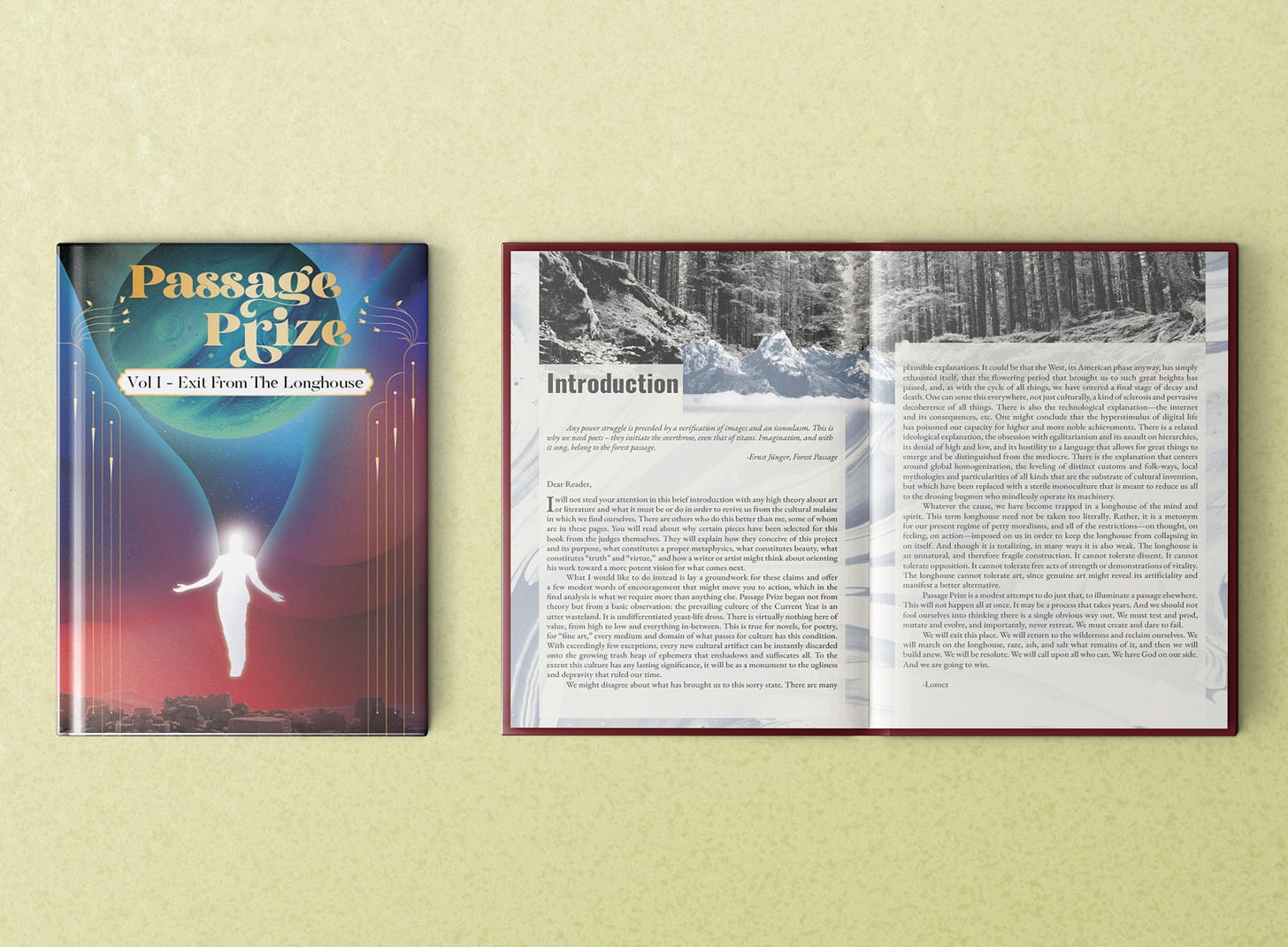My thoughts on Passage Prize Vol 1: Exit from the Longhouse. Potential spoilers ahead.
Initial impressions: Materials, texture, typography are all as advertised: high quality. Unfortunately, my copy was a misprint, which has taken away from the reading experience and is disappointing given the price tag. Out of order pages are 8, 19, 20, 17, 18, 15, 16, 13, 14, 11, 12, 9, 10, 21. I haven’t heard of anyone else running into this issue.
Note: I reached out to Passage Press and got a response within an hour. Ultimately, I won’t let this error dissuade me from future purchases.
The Introduction by Lomez is a good, brief recap of the mission of the Passage Prize contest. It may have been worth including an overview of what the inclusion criteria were. The table of contents highlights which entries were winners (1st, 2nd, 3rd place), but there is no mention of what the Editor’s Prize was or why the non-prize-winning entries were included.
The Judge’s Notes section felt unbalanced.
I was confused by Curtis Yarvin’s explanation for his selection of five finalists, rather than three. He states that the five finalists were “selected at utter random whim” from his “AA” category. I don’t know whether that means the ranking of 1st, 2nd, 3rd place was also done at random. His process comes across as unnecessarily contrarian. No criteria were explained (but some winning entries did merit explanation later).
Gio Pennacchietti’s contribution to the notes is brief. He references one of his essays (“Garden of Light”) regarding his thoughts on a “true artistic spirit within dissident spaces” that I wish had been included in the notes, or at least some excerpts. No criteria were explained, but explanations for the selection of winning entries were given later.
For the non-fiction contest, Benjamin Braddock gives increasingly brief descriptions of his three selections. An overarching discussion of what makes good non-fiction is not provided.
Zero HP Lovecraft provided the most detailed entry on his thoughts about the contest and the submissions he judged: eleven pages (compared to two pages for the three other judges combined). The essay was instructive. He summarizes and analyzes a rejected submission, making clear what the story was lacking thematically in terms of the underlying morality. He then looks at one of the winning stories and shows how it succeeds using the same analysis. Overall, the essay was insightful and would make good reading material for future Passage Prize aspirants.
“Men Only Want” by Noble Red – 3rd Place Poetry
The first entry features familiar forms and themes. Rhyme and meter that are pleasing to those of us who are unappreciative of or unimpressed by more modern styles of poetry. It was enjoyable to read and not overly referential of right-wing twitter. Yarvin’s commentary makes sure that we know that he knows it is light verse and that it is a good poem in spite of that.
“Le Mort D’Hitler” by Big Ron
This fragmented short story takes place over the course of a year in 2041/2. The main dystopic feature is the shopping mall arcade past time of detailed simulations of historical events, such as the birth of Hitler, that allows the participant to interact with history, such as killing said baby Hitler. The story is narrated, somewhat confusingly, in the 2nd person. The main character, you, keeps returning to this idyllic scene in late 19th century Austria. It’s an interesting take on escapism in a dystopian future, but I did not find it overly engaging.
“I Will Not Eat the Bug” by Travis J.I. Corcoran
The title is a little too cute, but the essay is excellent. Corcoran weaves a step-by-step narrative of how to slaughter and butcher an animal with his own thoughts on the reality of the experience. The messy conclusion of the essay is a self-conscious metaphor for the messy sausage-making process. Informative and enjoyable.
Only as I was looking up a bit more about the author did I realize I own a pair of books by Corcoran: “Escape the City” vols 1 and 2. I will be seeking out more of his writing.
“War” by Echo Chamber
A vivid and disturbing poem. I don’t engage with enough poetry to give a heavy critique, but I appreciate this one.
Continued here





Was the story Zero Lovecraft rejected called Enoch's Loop?
I have a question. What is the story with feminist framing that Zero Lovecraft rejected? Was it about a time loop?